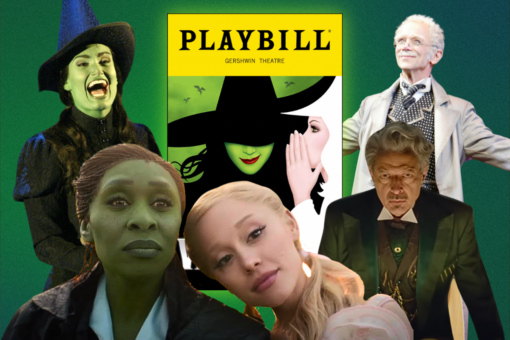What makes a musical Jewish?
People ask director Leigh Silverman that question all the time. An openly Jewish woman who was one of the youngest female directors to make her debut on Broadway (she was in her 20s when she brought “Well” to the stage), Silverman has thought a lot about the concept of Jewish theater.
“What are we talking about when we say Jewish?” she said. “Do people call ‘Cabaret’ Jewish? Is it just Neil Simon? To me, it’s about the themes that are being explored, who is being represented on stage, how the work is being made backstage and what is the experience for the audience?”
Case in point is the new musical “Suffs,” directed by Silverman and written by Shaina Taub. Both Silverman and Taub just received Tony Award nominations for their Contributions to “Suffs,” and the show received a coveted Best Musical nod in a highly competitive season.
A Broadway musical that is both written and directed by women is still a relatively rare phenomenon. But, in what may be a musical theater first, “Suffs” is written, directed and co-produced by Jewish women. (The original idea for the show came from Rachel Sussman, who is one of the lead producers.)
The new musical, which recently opened at the Music Box Theatre in New York, tells the story of the American women’s suffrage movement through the eyes of Alice Paul (portrayed by Taub). While Judaism is not explicitly depicted on stage — though Jewish women did participate in the fight for the vote — the message of the show resonates deeply with its creators’ Jewish values.
“There’s a bunch of different ways that I think Judaism intersects with ‘Suffs’ that doesn’t have anything to do with there being an out Jewish character on the stage,” said Silverman. For one thing, its creation was fueled, in part, by a line from the Talmud.
When Taub spoke with Hey Alma several years ago, she mentioned the Talmud quote at the front of her script: “You are not obligated to complete the work, but neither are you free to abandon.”
“It’s part of the thesis of the show,” Taub said. The quote is still a driving force behind the message of “Suffs” and remains an epigraph in the Broadway version of the script.

The musical deals with the intergenerational conflicts between Paul and the more established, older generation of suffragists, led by Carrie Chapman Catt (played by Jenn Collela). These women try to work within the system, unlike Paul and her progressive colleagues who are fiercely determined to fight to bring about change, organizing huge marches and speaking out against the president. The two women clash at times in the show, but at other moments, their work inspires and motivates the other.
“I think there’s a way that this show is asking you to remember, both who came before you and how you widen the path for those in front of you,” Silverman said.
There is a sense in the show that both the older and younger generations are needed in order to truly accomplish the goal of suffrage because no one generation can solve everything. Even Paul is unable to bring her vision of true equity to fruition; to this day, the ERA (Equal Rights Amendment) has yet to be ratified.
To Silverman, that concept reflects her own understanding and experience of Judaism. “You’re important, but you’re one of many. Do as much as you can and care for others, but then, also, there’s a sense that you’re one star in a constellation. Maybe that’s just my own particular brand of Judaism, but all of those things have felt very Jewish to me,” said Silverman.
An advocate as well as an artist, Silverman is doing her part offstage to make her industry a more inclusive place, even if she can’t solve all of its problems. She made headlines in 2018 when she helmed a Broadway production of “Lifespan of a Fact” that included the very first all-female design team. And “Suffs” is performed by a cast of all female-identifying and nonbinary performers. “I’m desperate for the theatrical ecosystem to be healthier,” Silverman said, “and if I can contribute to that, if I can help fix something as part of my legacy here, I hope to do that.”
Silverman is particularly motivated to tell the stories of historically marginalized people often excluded from the traditional narrative. In a speech she made at “The 24 Hour Plays” in 2016, just days after Trump was elected president, she explicitly described it as resistance to “lift the voices of the under-represented… double down on our efforts to diversify the stages all around this country and tell stories about people of all races, religions and sexual orientations.”

Eight years later, she continues to be inspired by the opportunity to tell those types of stories — stories like “Suffs.”
“It’s been a privilege to be able to say that that is the kind of work that I have made and continue to want to make,” Silverman said.
And she appreciates her collaborators on and offstage, while acknowledging the nuances of the double standards in the theater industry — and society at large. “It’s gratifying to have so many successful, powerful women working on the show, and also, it continues to be something that I wish didn’t feel niche,” she said, pointing out that “no one ever looks at a group of men and says, ‘Isn’t it so great? You’re all together.’ I long for the day when incredibly smart, talented, powerful women coming together to work feels like ‘Oh, yeah, that’s just another show.’”
In that sense, one could argue that “Suffs” and Silverman are both part of a long chain of theatrical progress, doing what they can to make things better while hoping that future shows will pick up the mantle and, to quote a lyric from the show, “keep marching on.”



